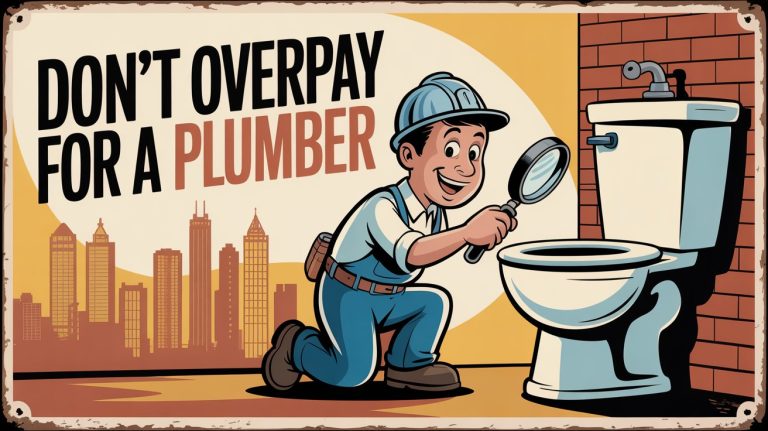
How to negotiate rates with a handyman
Hiring a handyman shouldn’t feel like buying a used car from a guy named “Slick” who keeps saying “Trust me.” Yet, for many homeowners, that’s exactly how it feels—uncertainty, mystery pricing, and the nagging feeling you might be paying too much just to have someone hang a shelf.
The good news? You can get the job done without breaking the bank, and without resorting to bribing your cousin who “kind of knows tools.” As a seasoned handyman who’s seen every trick in the book (and maybe pulled a few), I’m here to walk you through how to get the best rate when hiring a handyman—while keeping things fair for both you and the person wielding the power drill.
1. Know Exactly What You Want Done (and Don’t Be Vague)
One of the fastest ways to overpay is by being as clear as mud about what you need. If you tell a handyman,
“I’ve got a few little things around the house,”
…you’ve basically just given him a blank check.
Instead, create a detailed list of every job you want done:
- Fix the leaky faucet in the kitchen
- Patch the drywall in the hallway (approx. 2ft x 2ft)
- Hang three shelves in the office
- Replace the bathroom exhaust fan
The more specific you are, the easier it is for the handyman to estimate time and materials—and the harder it is for “mystery hours” to sneak onto your bill.
Pro tip: If you can, take pictures and send them when asking for a quote. It saves time and keeps “surprise” problems from popping up later.
2. Understand the Pricing Game (Hourly vs. Flat Rate)
Handymen usually charge in one of two ways:
- Hourly rate – You’re paying for every minute they’re on-site (plus maybe travel).
- Flat rate – You pay one set fee for the whole job.
Here’s the catch:
- Hourly rates can be great for small, quick tasks—but dangerous if the job gets complicated.
- Flat rates give you certainty, but you might overpay if the job ends up being easier than expected.
When in doubt:
- Small jobs? Ask for an hourly rate.
- Bigger projects? Negotiate a flat rate with clear parameters.
And remember, travel time counts for many handymen—so if they have to drive an hour to get to you, don’t be shocked if it’s on the bill.
3. Combine Jobs Into One Visit
Every handyman has a “minimum service fee.” This is why calling one out to change a lightbulb can cost $100—yes, you’re paying for their time, travel, and expertise, not just the bulb.
So, don’t hire them for one small thing at a time. Instead:
- Make a master list of everything you need done.
- Schedule it all for a single visit.
This way, you’re spreading that base cost across multiple tasks and getting more bang for your buck. Think of it like a handyman buffet—you’re already paying to sit at the table, so load up your plate.
4. Ask About Off-Peak Discounts
Yes, handymen have busy seasons—usually spring and summer when everyone’s doing home improvement projects. If you can, book your jobs in slower months like January or February.
You can also score deals by being flexible with scheduling:
“Hey, if you ever have a cancellation or a slow day, give me a call. I’ll be ready.”
This can sometimes get you a last-minute discount since you’re filling otherwise empty time on their calendar.
5. Provide the Materials Yourself (Sometimes)
Handymen often mark up materials—sometimes by 20–50%—because they take the time to source them, pick them up, and make sure they’re the right ones.
If you know exactly what you need (and can pick it up yourself), providing materials can save money. Just make sure:
- You buy the correct items.
- You have everything ready before they arrive.
Nothing burns time (and your wallet) like a handyman standing around while you run to the store because you bought the wrong size screws.
6. Get Multiple Quotes—But Don’t Just Pick the Cheapest
Sure, you could find someone on Craigslist who’ll work for $20 an hour and a six-pack, but you might also find yourself Googling “how to repair botched drywall” a week later.
Get at least three quotes from reputable sources. Compare not only prices, but:
- Experience level
- Customer reviews
- How detailed their estimates are
Red flag: If the quote is suspiciously low, either they don’t know how long the job takes (bad) or they’re planning to cut corners (worse).
7. Negotiate Like a Pro (Without Being a Jerk)
Here’s the golden rule: You’re negotiating for a fair price, not trying to rob them blind. A handyman is still a skilled tradesperson—they deserve to be paid well for their work.
Ways to negotiate politely:
- “If I book you for a full day, can you give me a better daily rate?”
- “If I pay in cash, can we skip the credit card fee?”
- “If I refer you to friends, can we work out a small discount?”
Sometimes the discount is monetary; other times, they might throw in a small extra task for free.
8. Don’t Wait Until It’s an Emergency
If your kitchen ceiling is actively leaking water, you’ve lost all negotiating power. Emergency jobs often come with rush fees—and rightfully so, because the handyman is dropping everything to fix your disaster.
Plan ahead for non-urgent repairs, and you’ll get better availability and rates.
9. Build a Relationship With a Good Handyman
Once you find someone skilled, honest, and reasonably priced, keep them close—like “send them a Christmas card” close.
A handyman who likes you might:
- Give you priority on their schedule
- Offer better rates over time
- Throw in little freebies (like tightening that loose doorknob while they’re there)
Plus, they’ll already know your house, which means fewer surprises and faster work.
10. Know When NOT to Hire a Handyman
Handymen are great for small to medium jobs, but sometimes you’ll save money (and avoid code violations) by hiring a specialist.
Don’t call a handyman for:
- Major electrical rewiring
- Structural repairs
- Large plumbing work
For those, you want a licensed pro—because nothing blows your “money saved” faster than having to pay someone else to redo the work.
Final Thoughts
Getting the best rate for a handyman is part preparation, part timing, and part relationship-building. Come in with a clear plan, bundle your jobs, be flexible, and respect their time and expertise.
Do that, and you’ll not only save money—you’ll also become one of those customers handymen actually want to work for. And trust me, in the handyman world, that’s worth more than gold… or at least worth a free shelf hanging.



